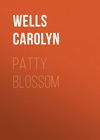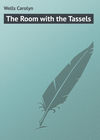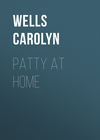Czytaj książkę: «Dick and Dolly», strona 6
CHAPTER XI
FUN WITH LADY ELIZA
Hannah, in her white cap and apron, came at once and opened the door. Being a well-trained maid, she stepped back, and held the door open for the lady to enter, but as the caller did not seem inclined to do so, but persistently held out her card, Hannah took it, saying, “The ladies are not at home, madam.”
Still the caller stood motionless, and Hannah looked at her with some curiosity. The lace veil so shrouded her features that they were not very discernible, but when Hannah’s glance fell on the rigid, pale hand, she gave a scream:
“My sakes, ma’am! is it dead ye are, or fainted?”
Not being able to grasp at once the truth of the matter, Hannah took the two cold hands in her own, and shook the lady slightly.
Lady Eliza toppled over, and would have fallen to the floor, but that Hannah caught her in her arms, and dragged her into the hall, where she dropped her on a large sofa.
“Delia!” she called, flying to the kitchen, “fetch some water. There’s a lady fainted!”
Dick and Dolly, unable to restrain themselves longer, came running in, and met Hannah, who returned, followed by Delia with a bowl of water.
“Hurry up, Hannah,” cried Dick. “She’s in an awful faint! Can’t you bring her to?”
Dolly was dancing around the prostrate form of the visitor, and Michael and Pat were peeping in at the front door.
“Ah, ye scallywags!” cried Delia, realising that some mischief was up. “What are ye up to, now? Who’s this leddy?”
So lifelike was the whole effect of the figure, that Delia could not at first take in the fraud. But when she did, she went off in peals of laughter, and Hannah joined in heartily.
“Aren’t ye the smart scamps, now!” cried Delia, proud of the latest exploit of the children. “An’ will ye look now, Hannah? That’s Miss Rachel’s best blue dress! I’m wonderin’ ye didn’t recognise it!”
“I never thought,” said Hannah, still gazing half-fearfully at the figure on the sofa. “I took it for granted it was a friendly visitor.”
Whereupon Dick outspread Lady Eliza’s arms in such a comical way, that Delia went off again in fresh bursts of laughter.
“Now to fool the aunties,” said Dick, after the servants had returned to their work and Dick and Dolly were left alone with their new possession. “How shall we fix it up, Dollums?”
Dolly considered. She was more ingenious than Dick in arranging dramatic effects, and at last she said:
“I think we’ll just have her seated in a corner of the veranda, and then, when the aunties come home, I’ll tell them there’s a lady waiting to see them.”
“Yes, that’ll be fine; let’s fix her now.”
So Lady Eliza Dusenbury was gracefully seated in a piazza chair. Upon her knees lay an open magazine, held in place with one slender pink hand.
“Those hands give her away, Dolly,” said Dick. “They don’t look a bit real.”
“Neither they don’t,” agreed Dolly; “I’ll get gloves.”
She ran upstairs and down again, bringing a pair of light kid gloves from Aunt Rachel’s room, which she succeeded in getting on the Lady Eliza’s hands.
“That’s a heap better,” said Dick; “now, with the veil, and as its getting sort of darkish, I don’t see how they’ll suspect at all.”
Quietly the Lady Eliza sat waiting. Not quite so quietly, Dick and Dolly sat on the top step of the veranda, waiting also, and at last Michael, who had gone after the Dana ladies, drove them up to the steps.
He had been charged by the twins not to mention their new acquisition, so, of course, had not done so.
Dick and Dolly met their aunts, with a smiling welcome, and then Dolly said:
“There’s a lady to see you, Aunt Rachel; as you weren’t home when she came, she sat down, over there to wait.”
In her pleasant, dignified way, Miss Rachel crossed the veranda, followed by Miss Abbie.
Though the ladies had slightly relaxed their “society” manner when greeting the twins, they instantly assumed it again as they went to meet their visitor.
“Good-afternoon,” said Miss Rachel as she neared the lady reading the magazine.
But the stranger did not look up, and Miss Rachel assumed she had not heard.
“How do you do?” she said, in louder tones, and held out her hand.
Miss Abbie also approached, and said “Good-afternoon,” and extended her hand, but apparently the visitor had no intention of stopping her reading.
With no thought other than that the lady was deaf or exceedingly preoccupied, Miss Rachel stepped nearer, and said very loudly:
“Good-afternoon!”
Still no response, and now Miss Rachel became frightened.
“She has had a stroke or something,” she exclaimed, and, stooping, she peered into the stranger’s face.
“Oh, Abbie! her cheek is hurt! Somebody has struck her, or thrown a stone at her. How dreadful!”
Miss Abbie fluttered about.
“Oh, Rachel! How awful! What shall we do? Call for help, but don’t let the children come here.”
“Yes, let us come,” cried Dick, as he and Dolly danced toward the group. “Let us come, she’s our friend; she’s Lady Eliza Dusenbury.”
“What do you mean?” cried Miss Rachel. “This lady has been hurt somehow. Go and call Hannah. Or perhaps we had better send Michael for a doctor.”
“No, don’t, Aunt Rachel,” said Dolly, who was now shrieking with laughter. “Lady Eliza isn’t much hurt. But isn’t she a dear!”
Dolly threw her arms round the strange lady’s neck, and patted the injured cheek gently. Magazine and shopping bag slid to the floor, but otherwise, the stranger made no motion.
“Dolly, behave yourself!” cried Aunt Abbie. “What do you mean by such actions? Let the poor lady be! Oh, what shall we do, Rachel?”
But Aunt Rachel had begun to see daylight. The irrepressible mirth of the two children told her that there was a joke somewhere, and then, as she recognised her own dress and hat, she suspected the truth.
“H’m,” she said; “suppose we take off the poor lady’s veil, and see how much she is hurt.”
“Suppose we do,” said Dolly, and she obligingly assisted her aunt to remove the veil from Lady Eliza’s beautiful, but scarred face.
“Well!” she exclaimed as she saw the glass eyes and the pink wax face, “what have you two been up to, now?”
As for Aunt Abbie, she sank down on a nearby chair, helpless with laughter.
Then Aunt Rachel followed her example, and Dick and Dolly danced round the three seated figures, while they screamed themselves hoarse with glee.
They moved Lady Eliza’s arms into threatening and despairing poses, each more ridiculous than the other.
They took off her hat, and breaking bunches of wistaria from the veranda vine, they wreathed her golden mop of hair with them.
They took Aunt Rachel’s eyeglasses from the little gold hook on her bodice, and perched them on Lady Eliza’s nose, sticking a pin in the wax to hold them on. And at each ridiculous demonstration the two aunts would become convulsed with laughter.
“Isn’t she lovely!” said Dolly, at last, as she hung around Aunt Rachel’s neck, and watched Dick tie the string of a red balloon to Lady Eliza’s hand, just so that the balloon kept thumping her in the face.
“She is beautiful,” agreed Aunt Rachel, with a shade of mental reservation in her tones. “Where did you get her, and why did you take my newest gown to play with?”
“I didn’t know it was your newest gown!” said Dolly, regretfully; but Aunt Rachel told her not to mind, they would take it off, and there were several older ones that would do equally well for Lady Eliza.
The story of the auction was told, and the aunts had another season of mirth over the ridiculous bidding.
“All right,” said Aunt Rachel, after the story was finished, “but never bid on anything unless you have enough money to pay for it.”
“We didn’t,” said Dick; “we counted our money first. And truly, this was the only thing in the whole auction we wanted.”
“Well, I’m glad you have her. I think you can have good fun with such a big doll. To-morrow I’ll find you some clothes.”
Aunt Rachel was as good as her word, and next day she went to the attic and found several discarded costumes of her own and Aunt Abbie’s that were fine for Eliza. Hats and bonnets, capes and shawls, a parasol and a feather boa, – indeed the Lady Eliza soon had a complete and even luxurious wardrobe.
Aunt Abbie touched up the injured cheek with some water-colour paints, and then the injury scarcely showed at all.
That afternoon the twins prepared to spring the joke on Pinkie and Jack. They expected them both to come over and play, and beforehand they got the Lady Eliza ready. The arbour in the playground was now nearly covered with vines, and formed a well-shaded tent.
In here, at a table, they placed Eliza, her hands meekly in her lap, and her face downcast. She wore a black-and-white checked suit, and a black hat and veil. Her hands were ungloved, but were filled with flowers, which concealed the artificial-looking finger-tips.
Having arranged her exactly to their liking, the twins sat on the veranda steps, waiting for their friends. Pinkie came first, and Jack came very soon after.
“Let’s go out to the playground,” said Dick, casually.
“All right,” agreed Jack. “It’s too hot for tag; let’s play hide and seek.”
They all sauntered toward the playground, and as they nearly reached it, Jack said:
“Why, there’s a lady in there!”
“A lady?” said Dick, looking surprised. “What are you talking about?”
“There is,” repeated Jack; “see.”
They all peeped through the vines, and sure enough, a lady was seated at the table. Her hands were full of flowers, but she appeared dejected, and her head drooped a little.
“It isn’t either of the aunties,” whispered Dolly, “they’re in the house.”
“Who is it then?” Jack whispered back, and Pinkie said, “Don’t let’s go in, I’m afraid.”
“Afraid of a lady!” said Dick. “Pooh, I’m not. Maybe it’s your mother, Pinkie.”
“No, it isn’t,” she replied. “Mother’s at home. Maybe it’s Hannah.”
“What would Hannah be here for?” said Dolly. “Let’s go in and see who it is.”
“All right,” said Dick, and he stepped inside. “She won’t speak to me,” he said, stepping out again. “You go in, Jack.”
Not wishing to be thought cowardly, Jack stepped into the arbour, and in his politest tones, said:
“How do you do, ma’am?”
But the lady did not move, and just looked at Jack with big blue eyes, that stared through her black veil.
“She’s a funny lady,” said Jack, rather bewildered. “She won’t speak, and she just stares at me.”
“You try, Pinkie,” said Dolly.
So Pinkie went up to the lady, and in her sweet little voice said:
“What’s the matter, lady?”
She, too, received only a blue-eyed stare, and no word of reply.
“Perhaps she’s asleep,” said Dick.
“No, her eyes are wide open,” said Jack, his own eyes also wide open in surprise.
“Then she must have fainted,” said Dick; “we must try to bring her to.”
He gave the lady a pat on the shoulder, but still she didn’t stir.
“Hit her harder,” said Dolly. “Don’t hurt her, you know, but you have to shake people to make ’em come out of a faint.”
Dick thumped her on the back, and slily bent her arm up until she seemed to be shaking her fist at them. The flowers tumbled to the floor, and her other arm flew up above her head.
“Oh!” cried Pinkie, and ran farther away from the now belligerent-looking lady.
“Oh!” cried Jack, catching on. Then, screaming with laughter, he seized the lady’s hand shook it, crying, “How do you do, ma’am! How do you do? I’m so glad to meet you!”
Pinkie was still mystified, so Dolly ushered her up to the lady, saying, “Miss Pinkie Middleton ’low me to make you ’quainted with Lady Eliza Dusenbury!”
Dick had taken off Eliza’s veil, and Pinkie at last realised what sort of lady she was meeting.
“Oh, Dolly,” she cried, “where did you get her? Isn’t it fun! I think she’s fine!”
“She’s great!” declared Jack. “You fooled me good, old Mr. Dick Dana! What’s her name, did you say?”
“Lady Eliza Dusenbury,” said Dick, “but we call her Eliza, if we want to. Let’s take her for a ride.”
They got the little express wagon that Dick and Dolly used to cart their plants or flower-pots around the gardens in, and lifted Eliza in.
“She’ll have to stand up,” said Dolly, “because she can’t sit down.”
“All right,” said Jack, “we’ll tie her so she won’t upset.”
They fastened her iron pedestal, which served her instead of feet, firmly to the wagon, and then proceeded to deck both vehicle and passenger with flowers, till it looked like a float in a parade.
Dolly and Pinkie made a gilt paper crown, and wound gilt paper around a long rod for a sceptre.
“Oh, let’s make her Queen of the Fairies!” cried Pinkie.
So the dress Eliza had on was changed for a white one. This was decked with ribbons and garlands of flowers. Crown and wand were put in place, and then the whole four combined their ingenuity to invent wings. At last they were cut from thin pasteboard, and covered all over with fringed white tissue paper. This fringe, about an inch wide, and cut fine, was quickly made, and when pasted on in close rows, gave a lovely fluffy appearance to the wings.
A gauzy white veil, spangled with gilt paper stars, floated down from the crown, and the Queen of the Fairies presented a most delectable appearance.
The express wagon was not good enough for this dream of beauty, so it was made into a float, by placing some boards on top of it. This top was neatly covered with a sheet and decked with flowers.
Then the Queen of the Fairies was raised to her triumphal car, and her four willing subjects drew her about.
Long reins were made by cutting strips of white muslin, and these were attached to four prancing little steeds, while the Queen held the ends in her waxen hands. The cortège made a tour of the grounds, and drew up finally at the house to exhibit their peerless Lady Eliza to the aunties, who expressed heartfelt admiration.
“It’s the best plaything ever,” declared Jack, as he and Pinkie went home. “We’ll be over to-morrow to play some more.”
CHAPTER XII
OBEYING ORDERS
“Children,” said Aunt Rachel, one afternoon, as dressed in their best calling costumes, she and Aunt Abbie were about to enter the carriage, “we are going to make some calls, and about five o’clock I want you to meet us at Mrs. Hampton’s, and we will all come home together.”
“Oh, Auntie Rachel,” said Dolly, “I don’t want to go calling to-day. I want to play.”
“I know it, dearie, and so I’ve let you off from most of the calls we’re making. But I especially want you to be with me at Mrs. Hampton’s, so you can play till half-past four, and then get dressed and meet us there at five.”
“All right, Auntie,” said Dolly, who was a sunny-tempered little girl, after all. “What shall I wear?”
“Put on your new white piqué, and Dick, wear your light-grey suit. Now, be sure, children, – be there promptly by five.”
“Yes’m; and if you’re not there shall we wait for you?”
“Yes,” said Aunt Abbie, “wait until we come, no matter what time it is. But we’ll be there about five.”
The aunts drove away and the twins played out in the garden until it was time to dress.
They started off, looking very demure with their clean clothes and freshly-brushed hair.
“I don’t want to go a bit,” said Dolly, with a little sigh, as she walked along.
“Neither do I,” replied Dick, “but we have to go, so there’s no use making a fuss about it. Where does she live, anyway?”
“Why, I don’t know; I thought Auntie told you.”
“No, she didn’t, but I know it can’t be far, because she said we could get there in ten minutes. Here’s old Abe, let’s ask him.”
The twins stopped an old man who was going by in his cart, and who was a well-known character in the town.
“Hello, Abe,” said Dick. “Do you know where Mrs. Hampton lives?”
“Sure, my boy. I just came from there, havin’ been doin’ some cartin’ for her. You see that red-brick house, over beyond those trees?”
“Yes.”
“Well, it’s the next one beyond, – a white one. You go over that way, and anybody’ll direct you.”
“All right; thank you, Abe,” and the old man drove on, while the twins followed the direction he had given them.
“I’d like to skip,” said Dolly, “but it makes our shoes all dusty.”
“No, we mustn’t do that,” agreed Dick. “Aunt Rachel would have a cat-fit if we weren’t spick and span when we get there.”
So they walked on sedately, only pausing now and then to pick a flower, or look at a bird on a branch.
They inquired once more, in order to be sure, and then turned in at Mrs. Hampton’s gate. A fine fountain was playing in the front yard, and the twins crossed the lawn to see if there were any fish in it. There weren’t, but the plash of the cool water was very attractive.
“I’ll dare you to stick your foot in,” said Dick, suddenly.
They stood on the very brink of the fountain basin, and so impossible was it for either twin to refuse a “dare,” that Dolly’s immaculate white shoe and stocking went flash into the water and out again before she realised what she had done.
“Oh, Dick!” she exclaimed; “you made me do that! What will Aunt Rachel say?”
“Too bad, Dollums,” said Dick, greatly disturbed at his own part in the mischief. “I didn’t think what I was saying.”
“And I didn’t think what I was doing! I dare you to stick your foot in!”
Partly because of the dare, and partly because he was quite willing to share his sister’s fate, Dick hastily thrust his own neat black shoe and stocking in the water.
“There!” he said, as half proudly he drew it out again. “Now we’re even!”
“Yes; but how can we go into Mrs. Hampton’s this way?”
“Perhaps they won’t notice. Mine doesn’t feel very wet, does yours?”
“Sopping! and they’ll drip all over her carpet.”
“Let’s wipe them on the grass.”
But the green grass did not improve the appearance of Dolly’s white shoe, though Dick’s black one didn’t show the effects of the bath so plainly.
“Come on, Dolly, we may as well face the music.”
They went on toward the house, and the dust of the footpath settled on Dick’s wet shoe and stocking until he was quite as untidy looking as his sister.
“Wow! isn’t it soppy!” he exclaimed as the water in his shoe oozed and spattered out.
“Horrid! I don’t see why we did it!”
“Well, keep up a brave face, maybe the parlour will be sort of dark and they won’t notice.”
They rang the bell, and a maid opened the door.
“Is Mrs. Hampton in?” said Dolly, in her, sweetest tones.
“Yes; walk in the drawing-room. What names?”
“Miss Dana and Mr. Dana,” said Dolly, and was about to explain that they had come to meet their aunts, when the maid disappeared.
She returned to say that Mrs. Hampton would appear presently, and for them to wait.
“’Course we’ll wait,” said Dick to Dolly, as the maid again left them. “The aunties aren’t here on time, after all. P’raps our feet’ll dry before they come.”
“I wish there was a fire. I’m dripping on this pretty light carpet. Dick, let’s go out in the kitchen or some place, and find a fire.”
“All right, come on.”
They left the drawing-room, and as they crossed the hall they saw a bright wood fire in a room across the hall, evidently the library. So they went in, and drawing up two big chairs, they sat down and held their two wet feet to the crackling blaze.
“This is gay,” said Dick, leaning back in his chair with a sigh of satisfaction. “We’ll be all dry in a few minutes, Doll.”
“Yes; but I wish Aunt Rachel would come before Mrs. Hampton comes down. I don’t know her. Do you?”
“Nope; never saw her. But the aunties are bound to be here soon. It’s quarter-past five, now.”
“What are you children doing?” said a voice behind them, and Dick and Dolly jumped from their chairs, and saw a lady coming toward them. She was a very pretty lady, in a trailing silk house gown, and lots of frizzy light hair.
Dolly thought she looked a little like Lady Eliza, and not at all like any of Aunt Rachel’s other friends.
“How do you do?” said Dolly, making her curtsey prettily, while Dick bobbed his head.
“How do you do?” returned Mrs. Hampton, “but who are you?”
“We’re Dolly and Dick Dana,” said Dick, “and our aunties said for us to meet them here at five o’clock. But they don’t seem to be here yet.”
“No; they’re not. Are your aunties Miss Rachel and Miss Abbie Dana?”
“Yes’m; and they said they would call here this afternoon.”
“And they told us if they weren’t here to wait till they came,” said Dolly.
“Yes?” said Mrs. Hampton, looking at her quizzically. “And why are you sitting almost into the fire? It’s a warm day.”
“Yes,” said Dolly, “but you see, we stepped into the fountain as we came along, and so we’re just drying our feet.”
“That’s a very good idea,” and Mrs. Hampton’s smiling eyes were as pleasant as if stepping into fountains was quite usual for her guests. “And so your aunts are coming to call on me?”
“Yes, at five o’clock. But they seem to be late, so, if you please, we’ll wait for them.”
They waited until half-past five, and then until quarter of six, and still the Dana ladies didn’t come. The twins grew very impatient, for it was most irksome to have to sit and talk polite conversation with a grown-up lady.
Mrs. Hampton asked so many questions too. Very impertinent questions they seemed to Dick, though he answered to the best of his ability.
Mrs. Hampton was smiling and pleasant, and seemed interested in hearing about the Dana establishment, but still Dick and Dolly felt uncomfortable, and wished their aunts would come.
At six o’clock Mrs. Hampton said she felt sure the aunts had changed their plans, and were not coming, and she delicately hinted that she would send the twins home.
“No,” said Dick, positively; “we must stay here till they come. Aunt Abbie said to wait, no matter what time it was. And, besides, if they have changed their plans, and are not coming here, they’d send Michael for us, anyway.”
Dolly agreed to this, and the two little martyrs sat for another half-hour.
“Well, if you stay any longer, you must stay to dinner,” said Mrs. Hampton at last. “Do you sit up to dinner at home?”
“We have supper at night,” said Dolly, and her lip quivered a little, for she was beginning to feel anxious about her aunts.
“Well, I have dinner at night, – at eight o’clock.”
“At eight o’clock!” exclaimed Dolly. “Don’t you get awfully hungry before that time?”
“No, I don’t,” said Mrs. Hampton, smiling; “but I’m sure you chickabiddies will. So suppose I give you a nice little supper up in my sitting-room, and excuse you from dinner? I have guests coming, and it isn’t exactly a children’s party, you see.”
“But we’re not going to stay here all night!” exclaimed Dolly in dismay.
“It looks that way to me,” said Mrs. Hampton. “I offered to send you home, and you said no. Now I feel sure your aunts won’t come, – it’s too late for them, and if you’re bound to wait for them, I can offer you supper and pleasant sleeping rooms, – but I can’t invite you to dinner.”
The twins were uncertain what to do. But after all, they had no choice. Aunt Rachel had told them to wait until she came, and Aunt Rachel’s orders were always to be obeyed. To be sure something might have happened to prevent the aunties from carrying out their plan of calling on Mrs. Hampton, but even so, they would have sent for the children. And if they had gone home, they would surely send Michael over for them at once. It wasn’t as if the aunties didn’t know where they were. They had sent them to Mrs. Hampton’s, and told them to wait there. So they waited.
They thought Mrs. Hampton seemed a little annoyed because they waited. But as Dick said to Dolly, “I’m not going to disobey Aunt Rachel for another lady. But all the same, Dollums, I do want to go home.”
“So do I,” said Dolly, “I think it’s horrid here.”
It wasn’t really horrid at all, but to be unwelcome guests in a strange house is not especially pleasant, no matter how pretty the house may be.
The twins had been taken up to Mrs. Hampton’s sitting-room, and in charge of a maid, had been served with a delightful little supper. Bread and milk, jam, fresh strawberries, and dear little cakes, followed by ice cream, made a goodly feast indeed. After it, their spirits rose a little, and they ate their ice cream with smiling faces.
“I think the aunties decided to come this evening instead of afternoon,” said Dick, unable to think of any other explanation.
“They never do make calls in the evening but perhaps that’s it,” said Dolly, doubtfully. “I hear people coming in, Dick, let’s go and look over the banisters.”
Carrying their ice cream plates with them the twins stepped out into the hall and looked over the banisters on the scene below.
It was a fascinating glow of lights and flowers and ladies and gentlemen in evening dress, for the dinner guests had come, and were standing about, engaged in conversation.
Dolly was enchanted with the grand ladies, with jewels in their hair, and with low-necked gowns, and Dick, too, leaned over the banister to see the gay scene. So absorbed were they that they did not heed their melting ice cream, and, almost at the same moment, the soft, cold mass slid from each tipped-up plate, on the heads and shoulders of the ladies and gentlemen below.
Such a shriek of dismay as arose brought Dick and Dolly to a realisation of what they had done, and in an agony of mortification they fled back to the sitting-room.
Here Mrs. Hampton found them, their heads buried in sofa pillows, and crying in muffled paroxysms.
“You must go home,” she said, and her cold, hard tones were more of a reproof than any words could have been. “My coachman will take you, and I wish you to go at once.”
“We wish to go, Mrs. Hampton,” said Dolly, striving to choke back her tears while she made some sort of apology. “We’re very sorry we came, and we’re ’ceeding sorry we spilled the ice cream. It was very good.”
This sounded as if Dolly merely regretted the loss of the dainty, but it was not so. She meant to compliment the supper that had been given them, but, what with their worry over Aunt Rachel’s absence, their own homesickness, and the awful accident of the ice cream, both children were completely upset.
“Please forgive us,” said Dick, holding out his little hand. “We’ve had a lovely time, – and, – and we hope you’ll come to see us.”
“I can’t make you out!” said Mrs. Hampton, looking at the children in perplexity. “I thought you threw down that ice cream purposely.”
“Oh, no!” cried both twins at once, and Dolly went on eagerly: “you see, we never saw low-necked ladies and gentlemen at a party before; and we were so awfully interested, we leaned over to see better, and I s’pose the gas-lights heated up our ice cream and melted it, and it just slipped off the plates.”
“We ought to have held the plates more level,” said Dick, thoughtfully; “I’m sorry we didn’t.”
“I’m sorry, too, for you mortified me terribly and annoyed my guests, which was worse.”
“It’s terrible!” said Dolly, with a sigh. “I don’t see how you can forgive us.”
“I couldn’t if you weren’t such a sweet little culprit,” said Mrs. Hampton, smiling, and catching Dolly in her arms and kissing her. Then she kissed Dick too, and, still smiling, she hurried away.
The maid found the children’s hats, and hurried them down the back stairs, where the coachman was waiting for them. Evidently the servants were not as forgiving as Mrs. Hampton, for Dick and Dolly were fairly hustled into the carriage, the door was banged shut, and they were rapidly driven homeward.
At Dana Dene, they were met on the threshold by two very frightened-looking ladies, and while Aunt Rachel and Aunt Abbie each clasped a twin in her arms, the Hampton carriage drove away.
“You dear babies! where have you been?” cried Aunt Abbie, while Aunt Rachel squeezed Dick with an affection too deep for words.
“Where have we been?” cried Dick, in amazement. “Why, we’ve been at Mrs. Hampton’s, where you told us to go, and wait for you. We’ve been waiting there ever since five o’clock!”
“Why, Dickie, dear,” expostulated Miss Rachel, “we went to Mrs. Hampton’s at five o’clock, and waited there for you until nearly six! Then we came home, and ever since we’ve been nearly frantic because we didn’t know where you were. Michael and Pat have been out hunting with lanterns.”
“But, Auntie, dear,” said Dolly, “we did go to Mrs. Hampton’s, and after we waited and waited, and you didn’t come, she gave us supper in her sitting-room, ’cause she had a dinner party in the dining-room, and the ladies had on beautiful frocks, all lacy and low-necked, and we spilled ice cream on ’em!”
“What!”
“Yes’m; we didn’t mean to, you know, but it melted.”
“Dolly, what are you talking about? Mrs. Hampton is not having a dinner party this evening. I just left there at six o’clock, so I know.”
“Well, our Mrs. Hampton is,” said Dick. “Are there two Mrs. Hamptons in Heatherton, auntie?”
“No, of course there aren’t! I wonder where you have been!”
“Well, she is Mrs. Hampton, we called her that, and so did the maid. It’s a beautiful house, – with a great big open round in the hall, where you can look down, – and a fountain outside.”
Miss Rachel sent for Michael.
“Michael,” said she, “where do you suppose these children have been? Whose carriage brought them home?”
“I don’t know, Miss Rachel. It’s a new turnout in Heatherton. All swell, jingly harness and livery, an’ the like o’ that.”
“Dolly says they live in a big white house with a fountain in front.”
“Arrah, thin, it’s the new people as is afther takin’ the Van Zandt place. A widdy lady of great forchin, I’m towld; an’ be the same token, I do belave they said her name was Hampden, or somethin’ like that.”



















